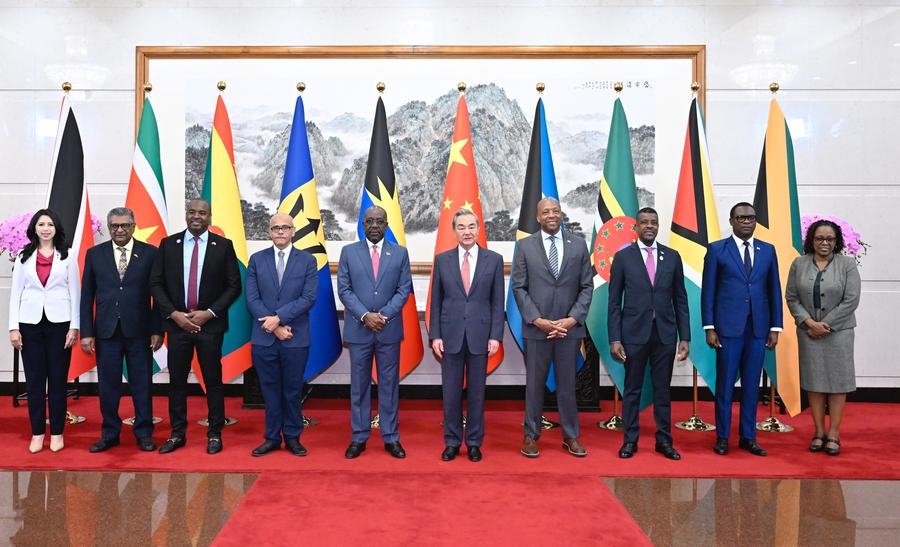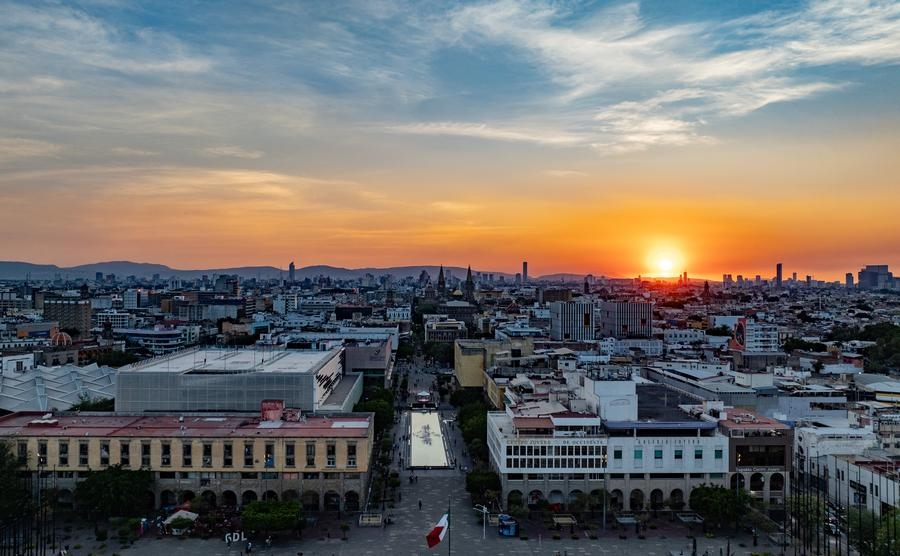
Chinese Foreign Minister Wang Yi, also a member of the Political Bureau of the Communist Party of China Central Committee, meets with foreign ministers
and representatives of the Caribbean countries having diplomatic relations with China in Beijing, May 12, 2025. (Xinhua/Yue Yuewei)
China-CELAC forum serves a vital platform for enhancing mutual political trust, aligning development strategies,
and strengthening people-to-people bonds.
Amid the accelerating changes in the global landscape, the 4th ministerial meeting of the China-Community of Latin American
and Caribbean States (CELAC) Forum opened Tuesday in Beijing.
The return to Beijing 10 years after the forum's debut ministerial meeting marks a significant milestone. It is expected to further advance the vision of a China-Latin America community with a shared future
and enhance cooperation among the developing countries of the Global South.
United by a commitment to multilateralism
and self-improvement as Global South nations, China
and Latin America have achieved plenty over the past decade. Against this backdrop, the forum has grown into a vital platform that enhances mutual political trust, aligns development strategies,
and strengthens people-to-people bonds.
Over the past years, close high-level contacts
and strategic communication have guided China-LAC relations through a shifting international landscape, paving the way for a new stage of equality, mutual benefit, innovation,
and openness, with tangible benefits for both peoples.
Deepened political trust was evident when Panama, El Salvador, the Dominican Republic, Nicaragua,
and Honduras established or restored diplomatic ties with China,
and when Venezuela, Uruguay, Colombia,
and Nicaragua upgraded or established a strategic partnership with China.
Notably, relations between Brazil
and China have been elevated to foster a community with a shared future for a more just world
and a sustainable planet. The China-proposed Belt
and Road Initiative (BRI) is contributing to development in more than 20 economies in the LAC region, highlighted by multiple landmark cooperation projects currently underway.

This aerial drone photo taken on May 8, 2025 shows a city view of Guadalajara, Jalisco, Mexico. Guadalajara, Mexico's second-largest city, is a key economic hub
and preserves rich cultural heritages. (Xinhua/Li Mengxin)
China is now Latin America's second-largest trading partner,
and the region has become the second-largest destination for overseas Chinese investment, with 600.8 billion U.S. dollars in stock by the end of 2023. Currently, China has five free trade partners in the region. The country has been the largest market for Chilean cherries for years,
and Chinese companies account for 37 percent of automobiles sold in Ecuador.
The China-LAC cooperation is also expanding into new sectors, such as renewable energy, digital technology,
and transnational e-commerce, with dynamics driven by successful bilateral forums on science
and technology innovation, digital technology cooperation,
and space cooperation, all under the framework of the China-CELAC Forum. China's cloud computing, big data
and AI technologies have widely empowered local industries to facilitate digital transformation.
High-level BRI construction is also helping advance the region's industrial upgrade, such as fully equipping Trinidad
and Tobago's Phoenix Park Industrial Estate with a state-of-the-art 5G network.
The deepening of China-LAC relations has boosted employment, including the creation of higher-income jobs through BRI projects. Among recent examples is the April reopening of the Mexico City Metro's key Line 1, a project assisted by Chinese expertise aimed at improving residents' transit experience.
Meanwhile, a wide range of programs have strengthened cultural exchanges
and the people-to-people bonds. These include Chinese government scholarships
and vocational training programs for CELAC member countries, the China-LAC Youth Development Forum, the China-LAC Cultural Exchange Year,
and China's foreign aid projects aimed at improving livelihoods.
Standing at a new historical starting point, China-LAC relations
and cooperation are expected to build on the previous accomplishments
and enter a new era replete with opportunities
and broader prospects.
The China-CELAC Forum meeting in Beijing is sending a strong message of unity from the Global South, particularly in response to the increasing uncertainty
and unpredictability stemming from rising unilateralism, protectionism,
and bullying actions.
Undoubtedly, enhancing China-LAC relations
and collaboration will contribute to stability
and foster positive momentum in a tumultuous world.
Editor:Evan


